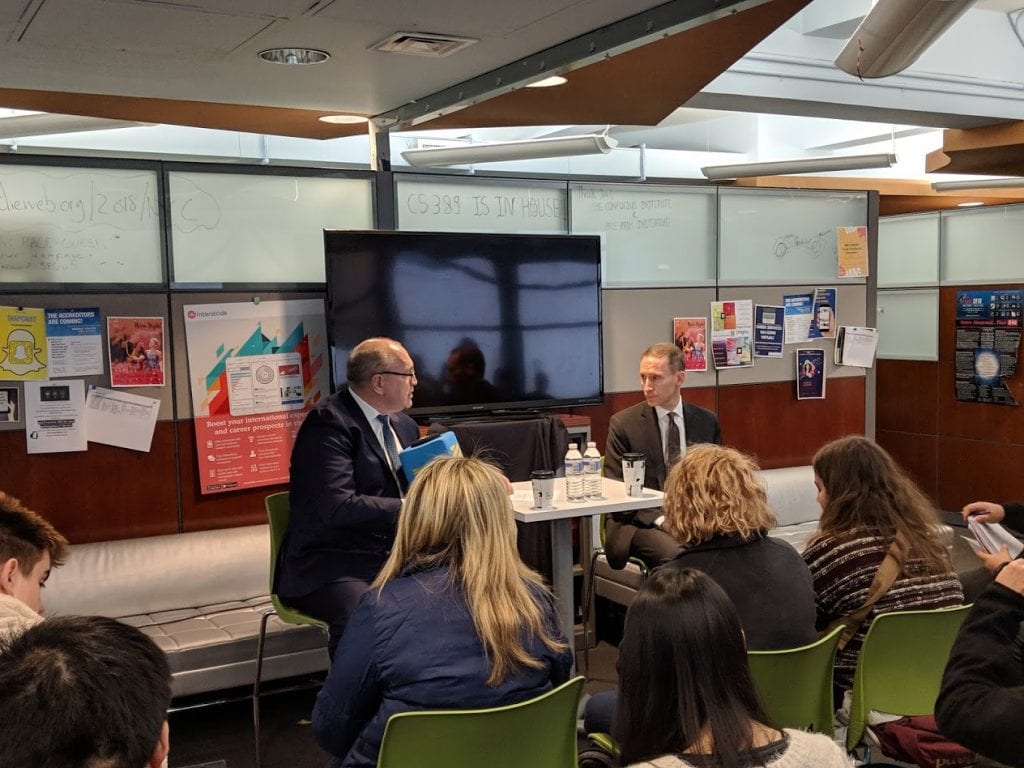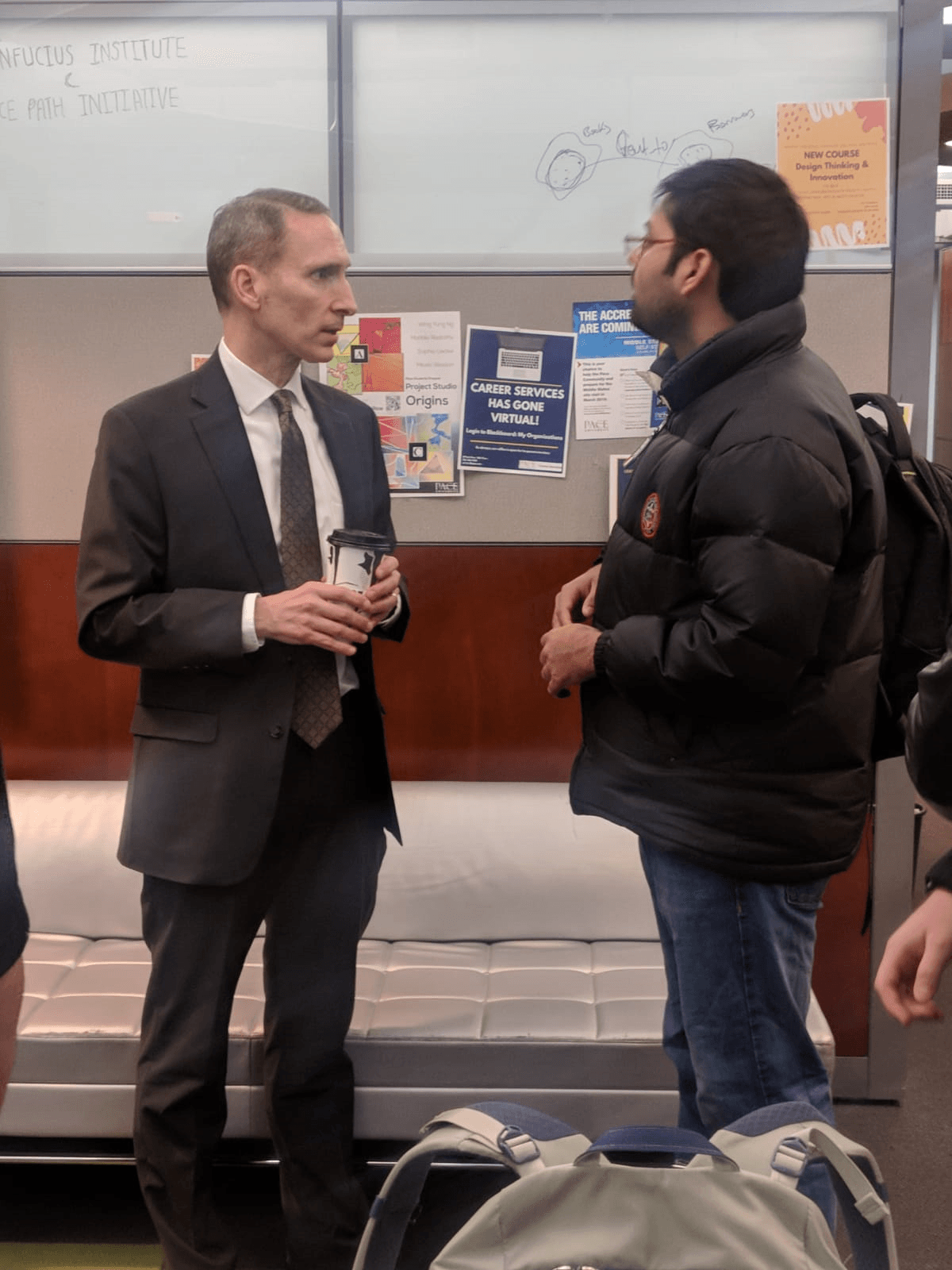The fall semester may be coming to an end but the Seidenberg Tech Leadership Series is showing no sign of slowing down! Events are already being scheduled for the spring, but for the tail end of the fall semester we had a fantastic guest: Daniel Barchi, SEM, SVP, and CIO of Newyork-Presbyterian.
Over the course of his career, Daniel has taken on the role of Chief Information Officer for numerous health care systems: Carilion Health System, Yale New Haven Health System, Yale School of Medicine, and currently New York-Presbyterian Hospital. Before taking on these high level positions, Barchi acted as a Naval Officer in the US Navy for six years. He was even awarded the Navy Commendation Medal for his leadership.
Testament to Daniel’s career and expertise was a great turnout of students who came to the Seidenberg School’s NYC campus the day before finals week. Despite escalating stress levels, around a hundred students stopped by to learn from our guest.
As with previous events, Daniel spent around an hour talking tech and leadership in conversation with Seidenberg Dean Jonathan Hill. Dean Hill quizzed the CIO about various aspects of his work, including the importance of technology in the healthcare industry, strategy, telemedicine and remote healthcare, and more.
One of the interesting remarks Daniel had was about technology’s importance regarding running a business. He said that he believed that running Newyork-Presbyterian – and other industries – successfully was built from a blend of “80% people, 15% process, 5% technology.”
“That 5% technology is important,” Daniel added, telling a story of how just that morning there had been a tech blackout in one of the locations his department serves. Despite technology just being a small part of the entire ecosystem, if that 5% goes down, the whole system fails – which is why Daniel and his staff work hard to get everything back up and running as quickly as possible. The people and process enable responses like that to happen.
“Technology is like an iceberg,” Daniel continued. “There’s only a tiny bit of an iceberg poking up out of the surface . . . as a technologist I need to make sure that bottom part is working well, out of sight and out of mind.”
As users, we tend to just care about the parts we interact with. “Everybody is focused on that 5% that’s above the surface,” Daniel said. Maintaining the larger 95% is what allows users to interact with systems without worry.
Dean Hill then asked about Daniel’s technology strategy.
“My job as the CIO is not about talking about the bits and bytes . . . it’s the strategy side of it . . . where do we invest our dollars, our resources, and our people.”
Part of the strategy is also developing new tech advancements. Daniel spoke at length about the cool things Newyork-Presbyterian was doing for medical staff and patients alike, including telemedicine initiatives like having physicians interact with patients over video calls and asking questions that got them to self-diagnose and allow the doctor to give treatment without being there in person.
Through this technology, Daniel revealed that physicians had “diagnosed three instances of appendicitis this month alone.”
 Did he think computers would replace the need for human doctors entirely? “We think that the physician or nurse PLUS the computer is better.” Although artificial intelligence is getting to the stage where using computers to diagnose and treat medical issues is becoming more and more possible, the nuance of the human mind is a crucial aspect to identifying and understanding the small distinctions that differentiate between similarly presenting issues.
Did he think computers would replace the need for human doctors entirely? “We think that the physician or nurse PLUS the computer is better.” Although artificial intelligence is getting to the stage where using computers to diagnose and treat medical issues is becoming more and more possible, the nuance of the human mind is a crucial aspect to identifying and understanding the small distinctions that differentiate between similarly presenting issues.
AI is a field with plenty of potential, not just in terms of technologically and career-wise, but financially too. “Artificial intelligence right now is like the gold rush in California was in 1849,” Daniel said. The key was to position oneself in the best place to capitalize from the technology. “Who made the money in the gold rush? The people who sold the picks and shovels.”
“What should these students be doing to prepare themselves for a career in this area,” Dean Hill asked.
“I’m a fan of people moving in their careers,” Daniel said. “If you think about your professors here who might have had a career in business and moved on to come here – people who have had training in one area can use their skills to move into another area.”
At the Seidenberg School and at Pace University, we always encourage our students to diversify what they learn. Knowing more than one area, and learning how to apply skills from one field into another, is what helps get jobs across different areas. Daniel affirmed that this was key to working in the tech sector today.
One area that is expected to remain current for the foreseeable future is cybersecurity.
“I’m always concerned about information security,” Daniel said. “We have about 8.5 million patient records . . . we have to keep it safe. There are always people that are trying to hack into our networks. You know better than most audiences that while we’ve been talking here we’ve probably had three penetration attempts into our systems.”
Daniel revealed that on the past weekend he had been in a long phone call when a hacker had attempted to penetrate their system with a version of the Wannacry virus – seven attempts in all – but the team managed to take care of it.
One of the last things Dr. Hill asked Daniel about was also related to security, but along a different vein. “Is privacy possible?” Dean Hill asked, “Or is the way the internet was built so open that perfect security is a pipe dream?”
Daniel replied with insights that many Pace students and internet users should pay attention to. “People make choices about what they put online . . . if going on vacation and posting where I am and pictures of myself is one end of the spectrum . . . banking online . . . is another end of the spectrum too.”
As users, we choose what we put online, whether it’s vacation location tagging on social media (that indicates our homes are currently empty) or our personal information on banking websites, investment accounts, and more.
“We can all make choices to make ourselves safer,” Daniel remarked.
But the truth is that the more we engage with the internet the more we put ourselves at risk.
The conversation closed up with a few final thoughts from Daniel. He encouraged students to go into careers doing things they loved, but if they could find ways to apply those passions to other areas, they could potentially excel. “If you love coding . . . for those of you who want to use it as a platform to do other things, I would encourage you to push the boundaries.”
Sharing one of his favorite quotes, Daniel illustrated his point.
Life shrinks or expands in proportion to one’s courage
- Anaïs Nin
We’d like to thank Daniel Barchi for his stellar appearance at the Seidenberg School of Computer Science and Information Systems at Pace University. The Seidenberg Tech Leadership series is one of our top event series that puts our students in front of exceptional leaders in the industry, and Daniel’s genial presence was perfect for bringing calm before the end of the semester.


